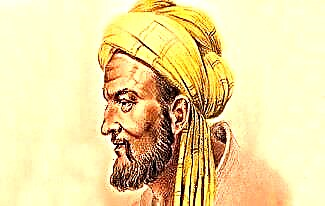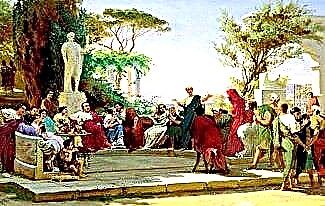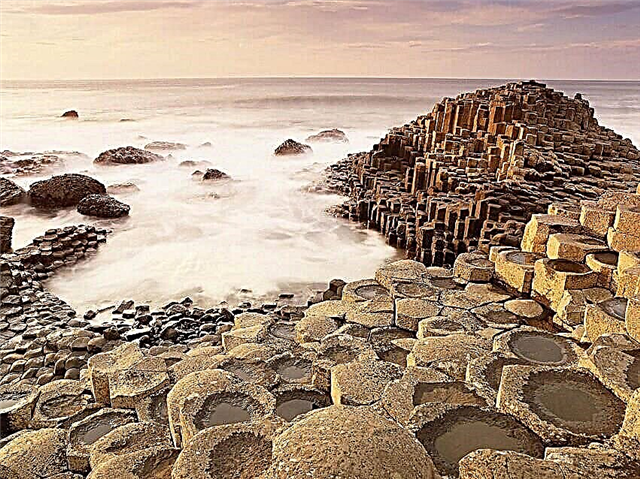Euclid or Euclid (c. The first mathematician of the Alexandrian school.
In his fundamental work "Beginnings" he described planimetry, stereometry and number theory. Author of works on optics, music and astronomy.

There are many interesting facts in the biography of Euclid, which we will touch on in this article.
So, here is a short biography of Euclid.
Biography of Euclid
Euclid was born around 325 BC. e., however, this date is conditional. His exact place of birth is also unknown.
Some biographers of Euclid suggest that he was born in Alexandria, while others - in Tire.
Childhood and youth
In fact, nothing is known about the early years of Euclid's life. According to the surviving documents, he spent most of his adult life in Damascus.
It is generally accepted that Euclid came from a wealthy family. This is due to the fact that he studied at the Athenian school of Plato, where far from poor people could afford to study.
It is worth noting that Euclid was well versed with the philosophical ideas of Plato, in many respects sharing the teachings of the famous thinker.
Basically, we know about the biography of Euclid thanks to the works of Proclus, despite the fact that he lived almost 8 centuries later than the mathematician. Also, some information from the life of Euclid was found in the works of Pappa of Alexandria and John Stobey.
If you trust the information of the latest scientists, then Euclid was a kind, polite and purposeful person.
Since the data on the man is catastrophically small, some experts suggest that "Euclid" should mean a group of Alexandrian scientists.
Mathematics
In his spare time, Euclid liked to read books in the famous Alexandria Library. He studied mathematics deeply and also explored geometric principles and the theory of irrational numbers.
Soon Euclid will publish his own observations and discoveries in his main work "Inception". This book has made a great contribution to the development of mathematics.
It consisted of 15 volumes, each of which focused on a particular area of science.

The author discussed the properties of parallelograms and triangles, considered the geometry of circles and the general theory of proportions.
Also in "Elements" attention was paid to the theory of numbers. He proved the infinity of the set of primes, investigated even perfect numbers and deduced such a concept as GCD - the greatest common divisor. Today, finding this divisor is called Euclid's algorithm.
In addition, in the book the author outlined the basics of stereometry, presented theorems on the volumes of cones and pyramids, not forgetting to mention the ratios of the areas of circles.
This work contains so much fundamental knowledge, proofs and discoveries that many biographers of Euclid are inclined to believe that the "Principles" were written by a group of people.
Experts do not exclude the possibility that such scientists as Archytas of Tarentum, Eudoxus of Cnidus, Theetetus of Athens, Gipsicles, Isidore of Miletus and others worked on the book.
For the next 2,000 years, Beginnings served as the primary textbook on geometry.
It should be noted that most of the materials contained in the book are not their own discoveries, but previously known theories. In fact, Euclid simply masterfully structured the knowledge that was known at the time.
Apart from Principles, Euclid published a number of other works concerning optics, the trajectory of motion of bodies, and the laws of mechanics. He is the author of the famous calculations that are practiced in geometry - the so-called "Euclidean constructions".
The scientist also designed an instrument for measuring the pitch of a string and studied the interval ratios, which led to the creation of keyboard musical instruments.
Philosophy
Euclid developed Plato's philosophical concept of 4 elements, which are associated with 4 regular polyhedra:
- fire is a tetrahedron;
- air is an octahedron;
- earth is a cube;
- water is an icosahedron.
In this context, "Beginnings" can be understood as the original teaching on the construction of "Platonic solids", that is, 5 regular polyhedra.

The proof of the possibility of constructing such bodies ends with the assertion that there are simply no other regular bodies besides the ones presented 5.
It is worth noting that the theorems and postulates of Euclid are characterized by a causal relationship that helps to see the logical chain of the author's inferences.
Personal life
We know practically nothing about Euclid's personal life. According to one legend, King Ptolemy, who wanted to learn geometry, turned to a mathematician for help.
The king asked Euclid to show him the easiest path to knowledge, to which the thinker replied: "There is no royal road to geometry." As a result, this statement became winged.
There is evidence that Euclid opened a private mathematics school at the Library of Alexandria.
Not a single reliable portrait of the scientist has survived to this day. For this reason, all of Euclid's paintings and sculptures are simply a figment of the imaginations of their authors.
Death
Euclid's biographers cannot determine the exact date of his death. It is generally accepted that the great mathematician died in 265 BC.
Euclid photo















